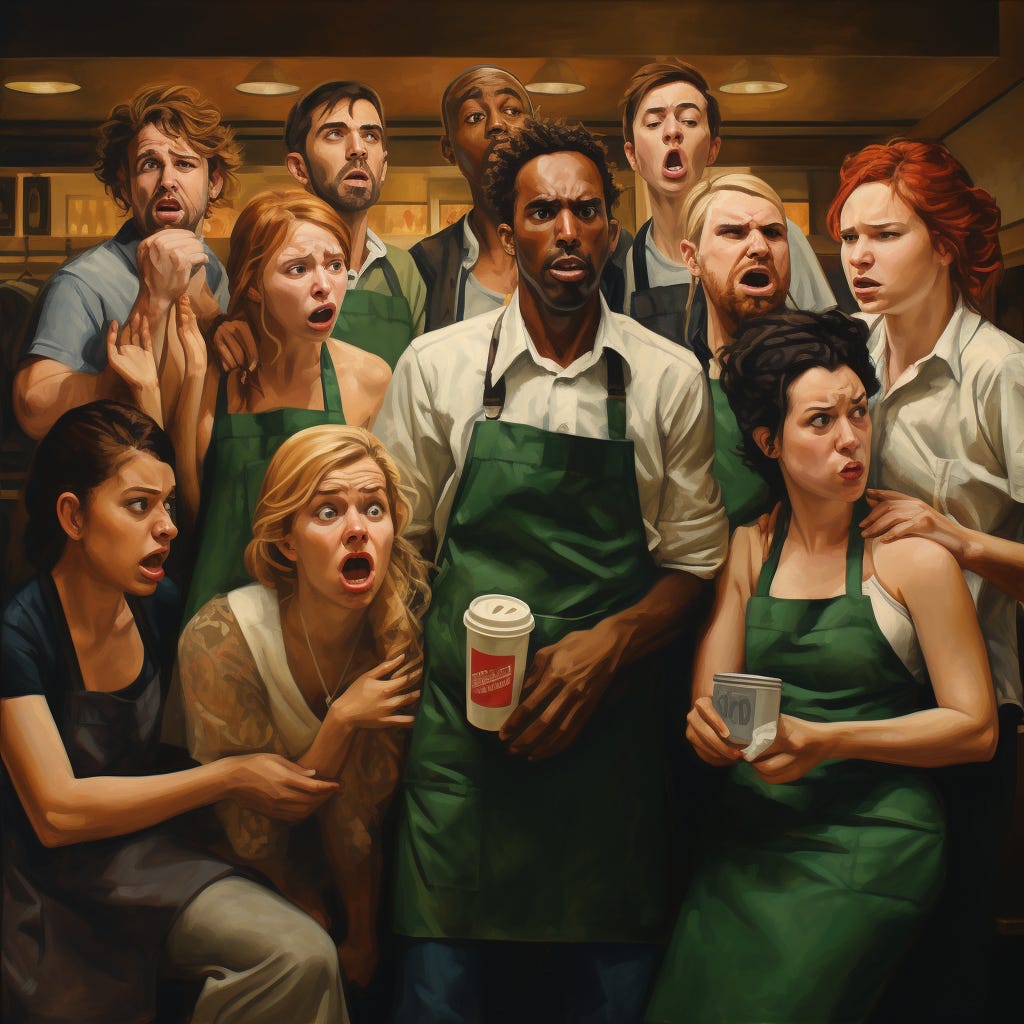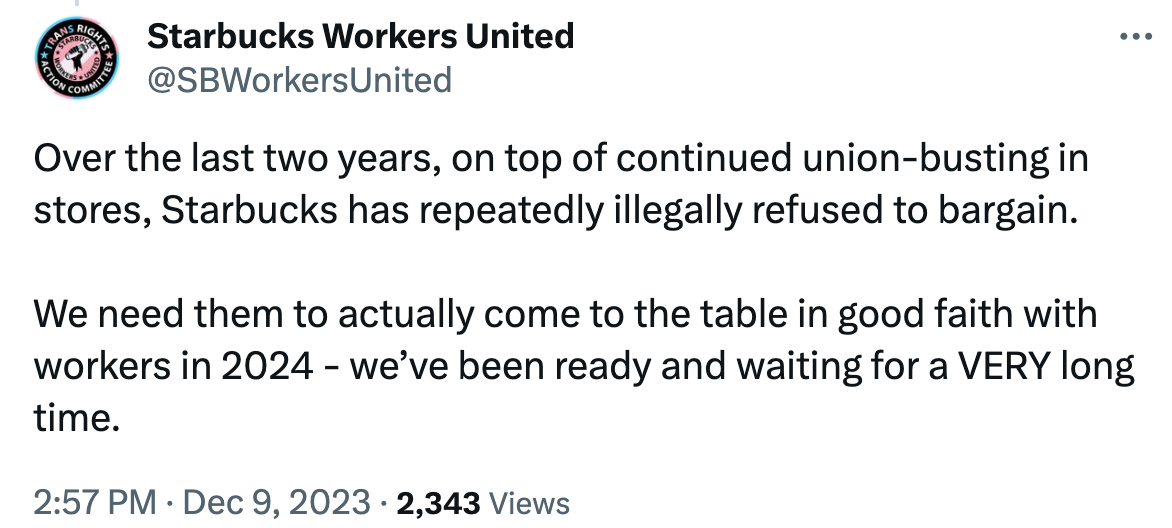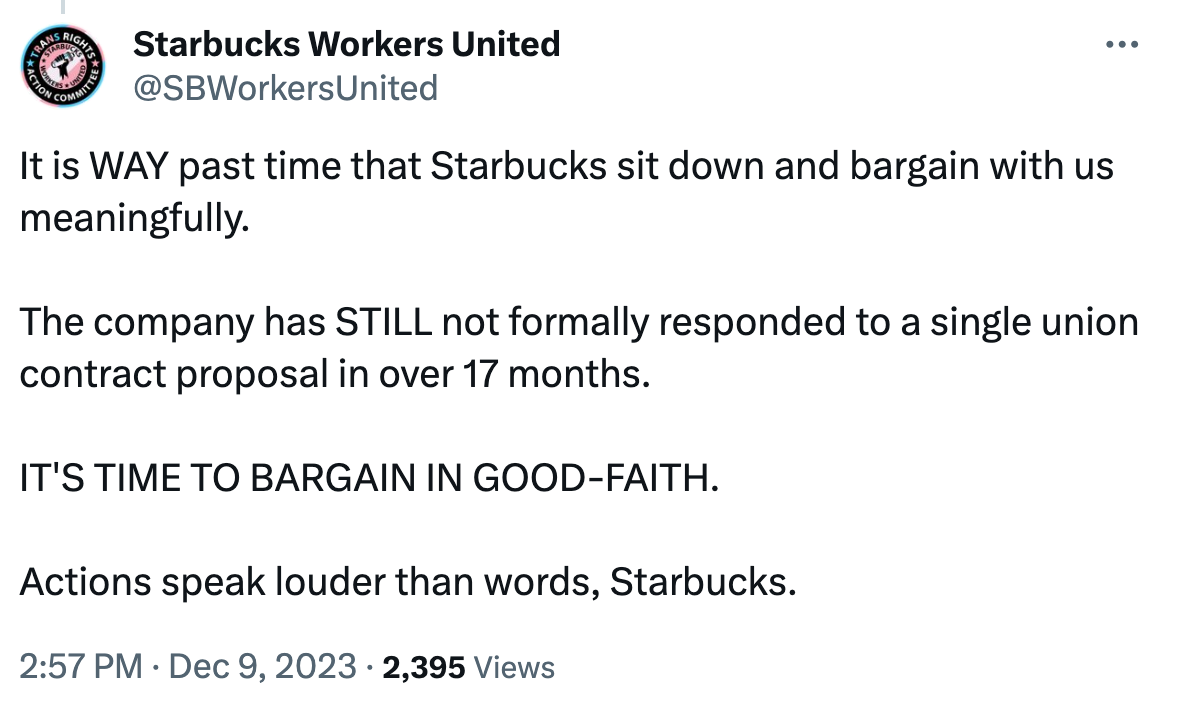Has the SEIU's Starbucks Workers United strategy been all wrong for unionizing baristas?
At Starbucks, why has Workers United's strategy gone so horribly wrong, but not the Teamsters or Steelworkers?
For two years, Workers United—an affiliate of the Service Employees International Union (SEIU)—has unionized over 350 of the nearly 9,000 Starbucks cafes throughout the United States.
To date, despite spending millions on its campaign to unionize Starbucks, the union has not been successful in negotiating a single collective bargaining agreement anywhere in the United States.
This is in light of the fact that other unions like the Teamsters and Steelworkers, according to the Seattle Times, have gotten much further in negotiations than Workers United.
Did Workers United’s deploy a failed strategy at the outset?
After a decade of the SEIU failing to unionize fast food restaurants en masse through its ‘Fight for $15 and a Union’ campaign, when the SEIU’s Workers United set out to unionize its first Starbucks stores in Buffalo, New York (and, later, elsewhere), the union decided to unionize Starbucks on a store-by-store basis.
Starbucks, on the other hand, argued to the National Labor Relations Board (NLRB) that the bargaining unit should consist of stores within a market or district.
“In fact, Starbucks originally sought to have elections on a market-wide or district-wide basis, but Workers United opposed that request, and argued that only single store units were appropriate,” the company states on its website.
The NLRB eventually agreed with the union’s argument that unionization and, thus, collective bargaining, should occur store-by-store, as single stores are an ‘appropriate unit.’
“The National Labor Relations Board dealt a blow to Starbucks’s legal strategy in response to a growing union campaign on Wednesday, rejecting the company’s argument that workers seeking to unionize in a geographic area must vote in a single union election,” reported the New York Times in February 2022.
Workers United has tried to have its (coffee) cake and eat it too.
Once the NLRB issued its decision on the appropriateness of single-store bargaining units, however, the union decided—now, without a legal foothold due to the NLRB’s ruling—to change its tactics and try to negotiate on national basis.
Given the union’s initial store-by-store arguments before the NLRB, and the NLRB’s ruling on the matter, “it is only appropriate that bargaining follow suit store-by-store and in person, to ensure that our partners voices can be heard, and their individual needs and unique situations are considered at the negotiating table,” the company states.
Workers United’s refusal to not record bargaining sessions
Over the last two years, Workers United and Starbucks have lobbed charges at one another, each accusing the other of refusing to bargain.
“The process has been contentious; regional offices with the National Labor Relations Board have issued 111 complaints against Starbucks for unfair labor practices, including refusal to bargain,” the Associated Press noted in November. “Starbucks says Workers United is refusing to schedule bargaining sessions.”
Along with negotiating on a store-by-store basis as opposed to a ‘national agreement,’ one of the other sticking points is the insistence to not record the bargaining sessions.
“Starbucks has required the negotiation sessions to be in-person to guarantee the sessions are not recorded, which is a labor law violation,” the Seattle Times explained over the weekend (emphasis added). “The NLRB prohibits recordings or transcripts of contract negotiations and has previously argued against recording bargaining sessions.”
In fact, according to a NLRB memo issued in 2018:
“The Board has long recognized that audio recordings and verbatim transcriptions have the potential to hamper open communications in collective-bargaining relationships. In Bartlett-Collins Company (1978), the Board determined that the presence of a court reporter or recording device during collective-bargaining sessions was preliminary and subordinate to substantive negotiations over “wages, hours, and other terms and conditions of employment” and was therefore a nonmandatory subject of bargaining. In so holding, the Board recognized that the presence of a court reporter or recording device could stifle negotiations before the parties had even begun to bargain.” [Emphasis added.]
Once again, like arguing for single store bargaining units before the NLRB, then changing its position after the fact, it seems that Workers United is attempting to bend legal precedence established by the National Labor Relations Board to fit its desired outcome.
Other unions having more success with Starbucks than Workers United.
The SEIU’s Workers United is not the only union to have successfully unionized Starbucks’ stores.
However, other unions do not seem to be having the same problems Workers United is having.
“Unlike Workers United, other unions have seen some progress in negotiating with the coffee giant,” the Seattle Times notes. “Starbucks said it has reached tentative agreements on more than 20 sections since meeting in person 14 times since November 2022 with the International Brotherhood of Teamsters, which represents workers at a store near Pittsburgh.”
Starbucks also said it reached a contract in August and October with the United Steelworkers for two individual stores in Alberta, Canada. Starbucks said it is negotiating with other Canadian stores represented by that union.
Although the Seattle Times does not state it explicitly, it is inferred that neither the Teamsters, nor the Steelworkers have attempted to record bargaining sessions.
Starbucks desire to resume negotiations with Workers United
On Friday, Sara Kelly, Starbucks’ Chief Partner Officer sent a letter to Workers United’s President Lynne Fox indicating the company would like to resume and complete negotiations with Workers United in 2024.
“If you are agreeable,” Kelly’s letter states, “we commit to the following and ask that Workers United does the same.”
Kelly then lists out Starbucks’ desired (conditional) outcomes:
We will treat each bargaining participant with dignity and respect.
We will refrain from any disparaging, profane, threatening, discriminatory, or abusive language, gestures, or conduct.
We will protect our workplace culture founded on inclusion, diversity, and equity.
We will schedule sessions to ensure partners at each store have an opportunity to participate.
We will conduct sessions without video or audio feeds or recording so that all participants are comfortable with open, honest discussions.
We will agree to maintain the confidentiality of personal information and personnel matters..
We will be professional and work together to find resolutions to partner concerns.
We will set as an ambition and hopeful goal the completion of bargaining and the ratification of contracts in 2024.
“We are proposing that bargaining resume with a set of representative stores in January 2024, and we are open to hearing other ideas and rules of engagement on how bargaining could proceed,” Kelly concludes. “We are sincere in this proposal and hope that we can begin the bargaining process that will allow Starbucks and the union to best prioritize our partners.”
As of this writing, there is no published response from Workers United’s president. Nor is there an indication that Workers United will back away from its national bargaining strategy, or its insistence at recording bargaining sessions.
In fact, the only response from the union appears to be posts on its ‘X’ (formerly Twitter) account on Saturday that appear that it is not changing its positions.
After two years of fighting over bargaining units, as well as the way in which bargaining is to be conducted, if Starbucks and the union cannot agree over those two significant issues, it appears that the goal of reaching agreements by the end of 2024 will remain elusive.
This, then, begs the question, will Starbucks baristas realize that, perhaps unionization with Workers United was a poor choice?
The NLRB blocks worker efforts to decertify Workers United
Already, workers at nearly 20 stores have filed to decertify Workers United. However, thus far, the NLRB dismissed workers’ efforts to have an election to decertify Workers United.
“After being disappointed by union representation, Starbucks workers throughout the country have filed decertification petitions to oust the Starbucks Workers United union,” states the U.S. Chamber’s Glenn Spencer. “However, the Board is using Rieth-Riley to dismiss these petitions and, in doing so, endorsing Starbucks Workers United’s own unlawful tactics to delay collective bargaining.
“In dismissing these petitions, the Board is infringing upon Starbucks workers’ Section 7 rights to not be represented by a union, in direct contravention of the Act,” states Spencer.
At this point, in the middle of Workers United’s war to unionize Starbucks and the company itself are Starbucks’ workers—many of whom likely assumed that unionization would be a slam dunk.
That is, perhaps, what they were led to believe by the union and its union paid “salts” and organizers.
If that is the case, one must wonder, why is it that the workers represented by the Teamsters and the Steelworkers are not experiencing the same problems?
Perhaps the problem is not, after all, with the company as so many may have been led to believe, but with Workers United and its failing strategy.






